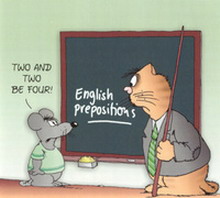Login form
Unit 24 Dialogues - Prepositions of Time
 1.What are you doing at the weekend?
1.What are you doing at the weekend?
On Saturday I'm meeting my friends at 2.00, and in the evening I'm watching a movie. On Sunday I'm not busy, so maybe we can go out together.
That sounds great!
-----
2.
I'm so busy these days!
How come?
I get up at 6.30 in the morning, and I finish work at 8.00 in the evening. It's a really long day.
You're so busy!
I know. My boss wants our project finished in March, so we're working really hard.
I think you need a holiday.
Well, in the summer I have three weeks holiday. I can't wait!
-----
3.
Hello, this is doctor Watson's clinic. How can I help you?
Hello, this is Tyler Saunders. I'd like to make an appointment.
OK, Mr. Saunders. How about on Tuesday at 3.30?
I'm busy all day on Tuesday. Is Friday OK?
Well, the doctor can see you in the morning at 9.30.
9.30 on Friday is fine.
Very good, Mr Saunders. We look forward to seeing you.
Thankyou, good bye.
Goodbye.
--------
Key Vocabulary
|
evening |
holiday |
Grammar
Prepositions of Time
Prepositions of time show the time something happens. For example: "I get up at 7.00" shows the time I get up.
Some of the most common prepositions of time are: in, on, at, from, to.
In
In is used for morning, afternoon, and evening. For example:
- I study Japanese in the afternoon.
- He gets up early in the morning.
In is also used for other periods of time, including months, seasons, years, centuries, and ages. For example:
- My birthday is in March.
- The Portuguese came to Japan in 1542.
- Flowers grow in spring.
On
On is almost always used for some kind of day. For example:
- My birthday is on March 29th.
- I go to church on Sunday.
- We visit my family on New Year's Day.
Compare: He gets up early in the morning.
But: He gets up early on Monday morning.
At
At is used for a particular time. For example:
- I study Spanish at 2.00.
- He gets up at 7.30.
- I come home at lunchtime.
At is also used for used for night.
Compare: I sleep in the afternoon.
But: I sleep at night.
From - to
From and to are used to show the start and end of a defined period of time. For example:
- I work from 9.00 to 5.00.
- Our vacation is from January 5th to February 1st.
-----

